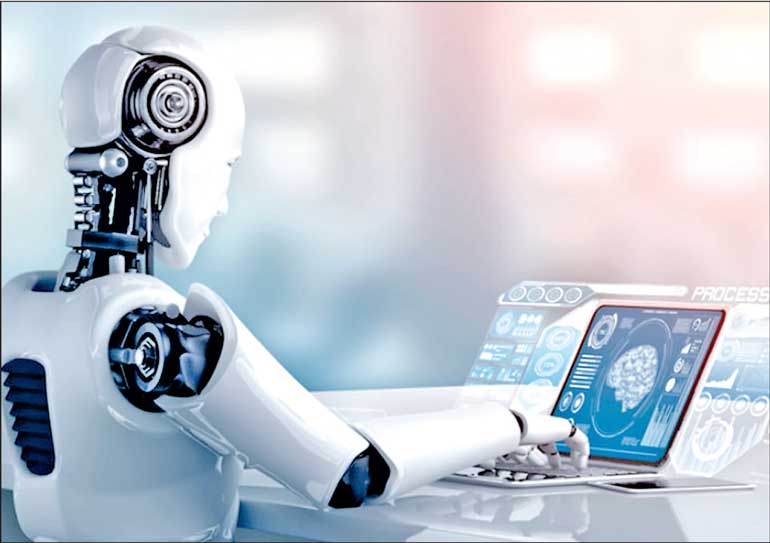Saturday Feb 14, 2026
Saturday Feb 14, 2026
Tuesday, 30 May 2023 00:10 - - {{hitsCtrl.values.hits}}

AI technology, programs and the advanced computing algorithms should harness to improve the way of life through augment decision making by identifying meaningful patterns in data
 Preamble
Preamble
There are many fascinating words floating in political and social media viz: Artificial Intelligence (AI), Augmented Reality, Virtual Reality, Machine Learning, thus exciting the minds of the audience who have no clue of what is being told but is an impetus to learn and explore the amazing things of the technology.
These IT technologies have come thus far without establishing clear operational boundaries. The absence of acceptable regulatory and ethical governance frameworks for preventing disasters, will endanger mankind. An urgent and thorough assessment is needed, forming a world acceptable treaty similar to the nuclear disarmament treaty. A famous historian and a scientist had alarmed that unethical application of AI may redefine humans as ‘not mysterious souls’ anymore, but hackable animals, once hacked easily be engineered without being aware. There is now a competition among the developed nations to become superpower in AIs. To our surprise, the brains of eminent persons will be taken and frozen after death to capture the information one had gathered over the lifespan to enhance the database for AI decision making.
What is AI?
There are multiple connotations for AI depending upon the area of industry AI being used. In general, and for easy understanding, AI is a highly data driven technology that stimulates human intelligence by machines, super computers and database together with algorithms or programs. AI is capable of generating outputs which humans take longer hours to process in a fraction of a second. The speed of technology development, proliferation outpace ethical underpinning exponentially. Secondly, the global leaders need to rethink the alarming aspects as a result of penetration across all facets of humans’ lives. Some scientists have speculated that humans may merge with technology and be re-engineered to be Homo Deus leading to transhumanism. Interesting things to watch in the future how human capabilities are being enhanced, augmented and improved by a cybernetic organism where it contains both biological and technological components.
Advantages and disadvantages of AI
The AI technology is currently being used in many business sectors, e.g. for promotion of products and services, gain efficiency and productivity, diagnose cause of illnesses and law enforcement purposes, etc. To highlight a case of “Narrow AI”, application; an X-ray record could be read in seconds and cause of illness is interpreted and pinpointed with reasonable accuracy. To gain accuracy of the interpretations, the database that is being used for the analysis must contain millions of past X-ray records and powerful algorithms capable of filtering out unrelated facts and run on supercomputers. There are many more applications that are beneficial for humankind if used ethically rather than for destructive purposes not abusing fundamental rights and human right of people; leading an easy pathway for an oppressive regime.
The Chinese credit system is designed to track individuals, and businesses, based on behaviour, habits, what you buy and provide a score measuring the trustworthiness. The credit score can go up and down based on the individual behaviours and activities, similar to how one accumulates “KUSAL and AKUSL” in the lifespan. The data is captured on real time basis using 400 million CCTV cameras across the country and building Big Data, a massive database. The new generation cameras are capable of identifying the age, gender, shape of face, etc.
Furthermore, AI could extract further than the physical appearance. It is also believed that this system is capable of profiling people who are unlawful to the government hence the individual’s privacy is in jeopardy. This is called a “new credit-based” supervisory mechanism and designed based on big-data and AI to provide early warning of risk factors in need of extra regulatory attention. This system is capable of differentiating the people and business either outstanding or ‘red-listed’ without being blacklisted. Red-listing allows citizens and institutions limiting access to certain privileges that may impact their lives.
On the negative side, following could be enforced on based on the negative credits of individual or institution as applicable. [a] Travel bans, [b] School bans, [c] Limit employment prospects, [d] Increased scrutiny – subject to audits or government inspections and [e] public shaming.
To put into perspective similar systems are in operation elsewhere; Australia, Germany and India. Indian system ‘Aadhaar’ somewhat matches with China Big Data social credit system but not centralised. Do the state-owned credit systems violate the basic HR and FR?
Current stage of AI and risks
AI is still evolving and many countries are investing millions on AI developments.
As it develops and explores new areas of its applications, it poses multitude risks. In the transport space, autonomous driven vehicles understandably are among the highest impact risks, especially the safety. Therefore, it is an urgent need not to overlook those risks that may arise from the usage, nor the unease that the complexity of AI technologies can produce in the wider public. In the context of social wellbeing, use of AI could affect physical and mentally trespass the privacy and undermine the human rights. Public trust is a vital factor before deploying the AI driven technology. All the determinations, the outputs of AI depend upon the algorithms, the appropriateness of the database used.
As the increased use of data-driven technology poses novel cybersecurity risks beyond the mere digitisation of individual systems, the data collected by way of machine learning opens up a plethora of new avenues for adversarial attacks by the thieves, it is imperative to closely assess and prevent them. The sale of data has become a good business, the administrators need to keep a close watch and increase to prevent hackers from intrusion.
Conclusion
In 1984 the famous novelist George Orwell in one of his books phrased “Big Brother is watching you”; this futuristic comment shows how governments intend to monitor and control its citizens by suppressing the will of the populace. In the day and age this has now become a reality and evolving violating the ethical norms. Through machine learning the privacy of citizens is being encroached, the question to be asked is, how much privacy one needs to sacrifice, surrender for state security. People need to realise that by the intrusion of privacy, the whole of life is becoming controlled in the interest ostensibly of having a healthy society. In Sri Lankan context, we have seen the President wants to appoint a taskforce to expedite AI development and apply the technology to various industry sectors to gain edge over the countries in the West Asia. While appreciating the initiative and urgency, Sri Lanka should not incline to obtain transfer of technology especially under BOI tax concessions either from India or China. AI for Sri Lanka should be a homegrown one and should be targeted immediately to health, commercial business and service delivery areas.
Furthermore, producing 10,000 engineers yearly is not an answer; we need to produce quality and able set of engineers while not flooding the supply. From all signs of government are leading to an autocratic and authoritative state, it is vital to bring ethical safeguards and governance on urgent basis preventing intrusion privacy. The proposed ATA bill to be tabled in parliament and the recent indications of the President allegedly a non-AI process which shows clear signals of oppression who speaks against demonstrations. China’s AI system is centralised and is targeted to capture people who criticise CCP despite heavy criticism from the West.
In the positive side, the AI technology, programs and the advanced computing algorithms should harness to improve the way of life through augment decision making by identifying meaningful patterns in data. AI in this context, should aim to help government agencies cut costs, free up labour hours for more critical tasks, and deliver better, more targeted services. Sri Lanka Government needs to rethink their strategies in SOE restructure for exclusively improving the productivity of delivering public service.
It is also suggested to explore the possibility of applying in the areas of legal litigation thus cutting down the waiting periods assisting judges to make the decision making quick and accurate.
This requires building a database of all past cases and rolling into one. Furthermore, if the records of audio and video are available of the court room, through machine learning, the clarity of data could be further enhanced for AI applications. If Sri Lanka has skills to manually build from paper records of past data as opposed to waiting for machine-learning to develop and utilised partial implementation in litigation could commence soon.
The cricket enthusiasts are aware, how the decision-making process of giving LBWs is enhanced to assist the 3rd umpire sitting distance away from the cricket pitch. This is a typical narrow AI application.
Source of references:
https://www.youtube.com/watch?v=Bw9P_ZXWDJU&t=396s&ab_channel=TalksatGoogle
https://www.youtube.com/watch?v=17bzlWIGH3g&t=1240s&ab_channel=JohnAnderson
https://www.gov.uk/government/publications/ai-regulation-a-pro-innovation-approach/white-paper
https://nhglobalpartners.com/china-social-credit-system-explained/